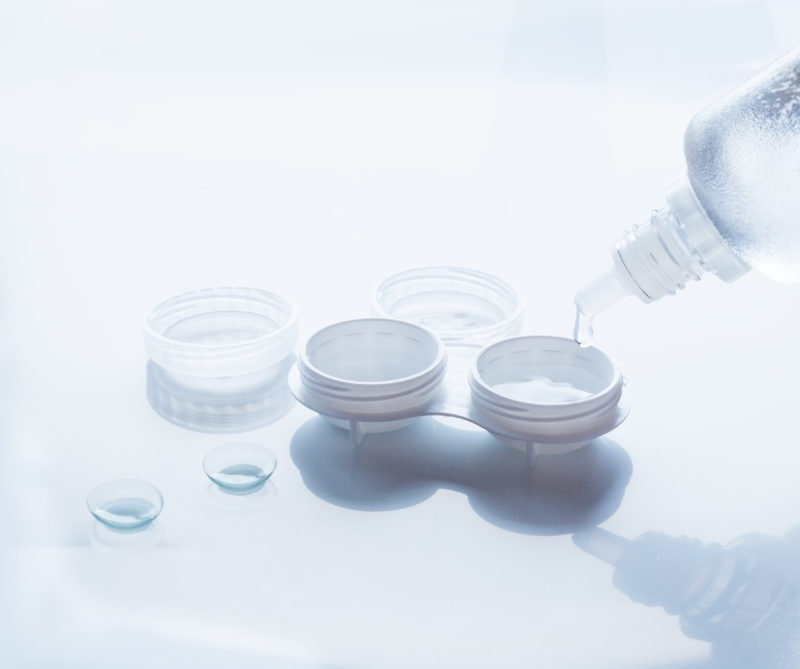Did you know? Over 45 million Americans wear contacts. That’s a lot of lenses!
As a popular form of correcting vision for consumers concerned with convenience and aesthetics, contacts are continuing to gain momentum. However, contacts aren’t without their flaws, and some wearers experience minor issues or discomfort with the lenses.
Contact lenses are a foreign object in the eye and have the potential to exacerbate seasonal allergy symptoms and make it difficult to assess the true cause of irritation. Of course, with any discomfort or abnormal feeling, you’ll want to remove your lenses and consult with a physician.
Could you be allergic to your contacts? We explore this common question and what to do if you think your contacts are a cause for concern.
What Causes a Contact Allergy?
Contact lens allergies are a bit more complicated than other allergies, like a food allergy.
Contacts are actually made from medical grade, hypoallergenic materials. So, in most cases, the contact materials do not cause the allergic reaction. Rather, the ‘allergy’ is caused by a buildup of contaminants. However, in rare cases, people can develop an allergy to the actual lenses.
This happens when proteins that naturally build up on contacts enters the bloodstream via the eyelids. This protein breaks down naturally when contacts are removed and stored in contact solution. If and when these proteins end up being absorbed by the body, the immune system identifies the proteins as foreign invaders and attacks them, resulting in a reaction.
What are the symptoms of a contact allergy?
You might be allergic to contacts if you experience the following symptoms:
- Redness
- Watering
- Itchiness
- Burning
- Sensitivity
- Minor swelling
- Discomfort
These are also symptoms of seasonal eye allergies, a condition easily remedied with over the counter eye drops, and other common eye conditions. The only way to know the true cause of irritation is to consult with your eye physician.
What Are Not Symptoms of a Contact Allergy?
The following symptoms are not associated with a contact allergy and can indicate a more serious eye issue:
- Pus or discharge
- Severe pain
- Loss of or blurred vision
- Severe swelling
- Flaking of the eyelids
If you experience any of these symptoms, contact your eye care provider immediately for assistance.
What is Contact Lens Intolerance?
Unrelated to an allergy, contact lens intolerance occurs when the wearer experiences severe pain whenever contacts are worn. This condition is easy to recognize as the pain is persistent and unbearable. The true cause of contact intolerance is unknown but often associated with the following conditions:
- Astigmatism
- Nearsightedness
- Farsightedness
- Chronic dry eye
- Ocular conditions
These are just a few of the common conditions associated with contact intolerance. Remember—if you experience severe pain when wearing contacts, you might be intolerant and should seek assistance to discuss options.
Other Causes of Irritation
As true contact allergies are rare, other conditions are often the cause of discomfort. If symptoms of irritation persist, you should visit your eye doctor to properly diagnose the issue. Here are a few other potential causes of eye irritation:
- Seasonal allergies
- Contact solution
- Eye infection
- Corneal foreign body
- Corneal abrasion
What to Do?
First, check the expiration date of your lenses to be sure they are still medically safe to wear. If the lenses have expired, dispose of them immediately.
If they are not expired, remove the lenses and wear glasses for a few days to see if symptoms subside. If they do, your contacts could be the issue and you should seek advice from your optometrist to discuss options.
If the symptoms do not go away, your contacts are likely not the cause. You’ll still want to meet with your eye care physician to properly diagnose and treat your eye symptoms.
Here are a few other tips on avoiding eye irritation:
- Wash your hands before handling contacts or touching your eye
- Clean your contact lenses regularly
- Refresh your contact solution often
- Wash your contact lens case regularly and allow them to dry completely
- Replace your lens case every thirty days
- Consider daily disposable lenses to reduce the risk of contamination
- Use eye drops to reduce irritation
- Never share contacts

The Bottom line? If you ever experience any kind of pain or discomfort while wearing your contacts, visit your local eye doctor for a formal evaluation.

